
Concept explainers
Calculate the horizontal deflection and vertical deflection at joint B.
Answer to Problem 1P
The horizontal deflection at joint B is 0.567 in.←_.
The vertical deflection at joint B is 0.126 in.↑_.
Explanation of Solution
Given information:
The truss is given in the Figure.
The value of E is 29,000 ksi and the value of A is 5.25 in.2
Procedure to find the deflection of truss by virtual work method is shown below.
- For Real system: If the deflection of truss is determined by the external loads, then apply method of joints or method of sections to find the real axial forces (F) in all the members of the truss.
- For virtual system: Remove all given real loads, apply a unit load at the joint where is deflection is required and also in the direction of desired deflection. Use method of joints or method of sections to find the virtual axial forces (Fv) in all the member of the truss.
- Finally use the desired deflection equation.
Apply the sign conventions for calculating reactions, forces and moments using the three equations of equilibrium as shown below.
- For summation of forces along x-direction is equal to zero (∑Fx=0), consider the forces acting towards right side as positive (→+) and the forces acting towards left side as negative (←−).
- For summation of forces along y-direction is equal to zero (∑Fy=0), consider the upward force as positive (↑+) and the downward force as negative (↓−).
- For summation of moment about a point is equal to zero (∑Mat a point=0), consider the clockwise moment as negative and the counter clockwise moment as positive.
Method of joints:
The negative value of force in any member indicates compression (C) and the positive value of force in any member indicates Tension (T).
Condition for zero force member:
- 1. If only two non-collinear members are connected to a joint that has no external loads or reactions applied to it, then the force in both the members is zero.
- 2. If three members, two of which are collinear are connected to a joint that has no external loads or reactions applied to it, then the force in non-collinear member is zero.
Calculation:
Consider the real system.
Find the member axial force (F) for the real system using method of joints:
Let Ay be the vertical reaction at the roller support A.
Let Cx and Cy be the horizontal and vertical reactions at the hinged support C.
Sketch the free body diagram of the truss as shown in Figure 1.
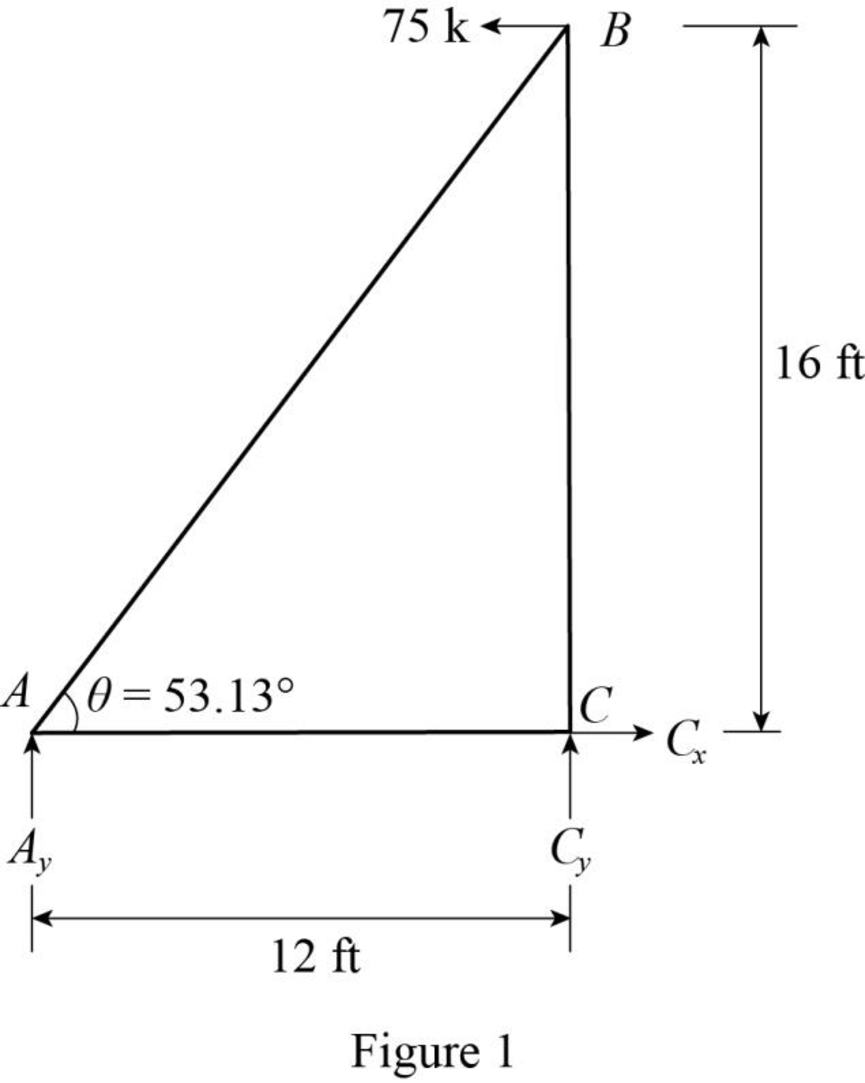
Find the reactions at the supports using equilibrium equations:
Summation of forces along x-direction is equal to 0.
+→∑Fx=0Cx−75=0Cx=75 k→
Summation of moments about C is equal to 0.
∑MC=0−Ay(12)+75(16)=0Ay=100 k↑
Summation of forces along y-direction is equal to 0.
+↑∑Fy=0Ay+Cy=0Cy=−Ay
Substitute 100 k for Ay.
Cy=−100 k=100 k↓
Sketch the free body diagram of joint A as shown in Figure 2.
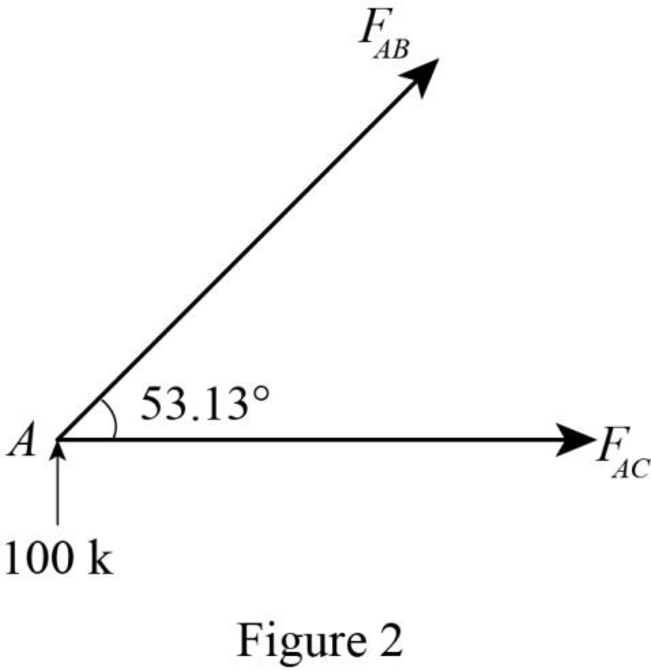
Apply equilibrium equation to the free body diagram of joint A:
Summation of forces along y-direction is equal to 0.
+↑∑Fy=0100+FABsin53.13°=0FAB=−125 k
Summation of forces along x-direction is equal to 0.
+→∑Fx=0FAC+FABcos53.13°=0
Substitute −125 k for FAB.
FAC+(−125)cos53.13°=0FAC=75 k
Sketch the free body diagram of joint C as shown in Figure 3.
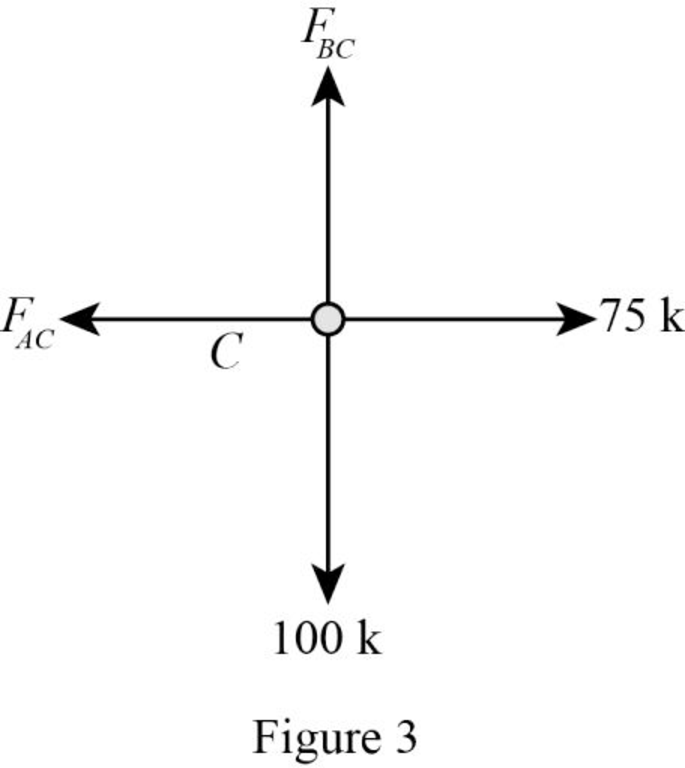
Apply equilibrium equation to the free body diagram of joint C:
Summation of forces along y-direction is equal to 0.
+↑∑Fy=0−100+FBC=0FBC=100 k
Sketch the resultant diagram of the real forces as shown in Figure 4.
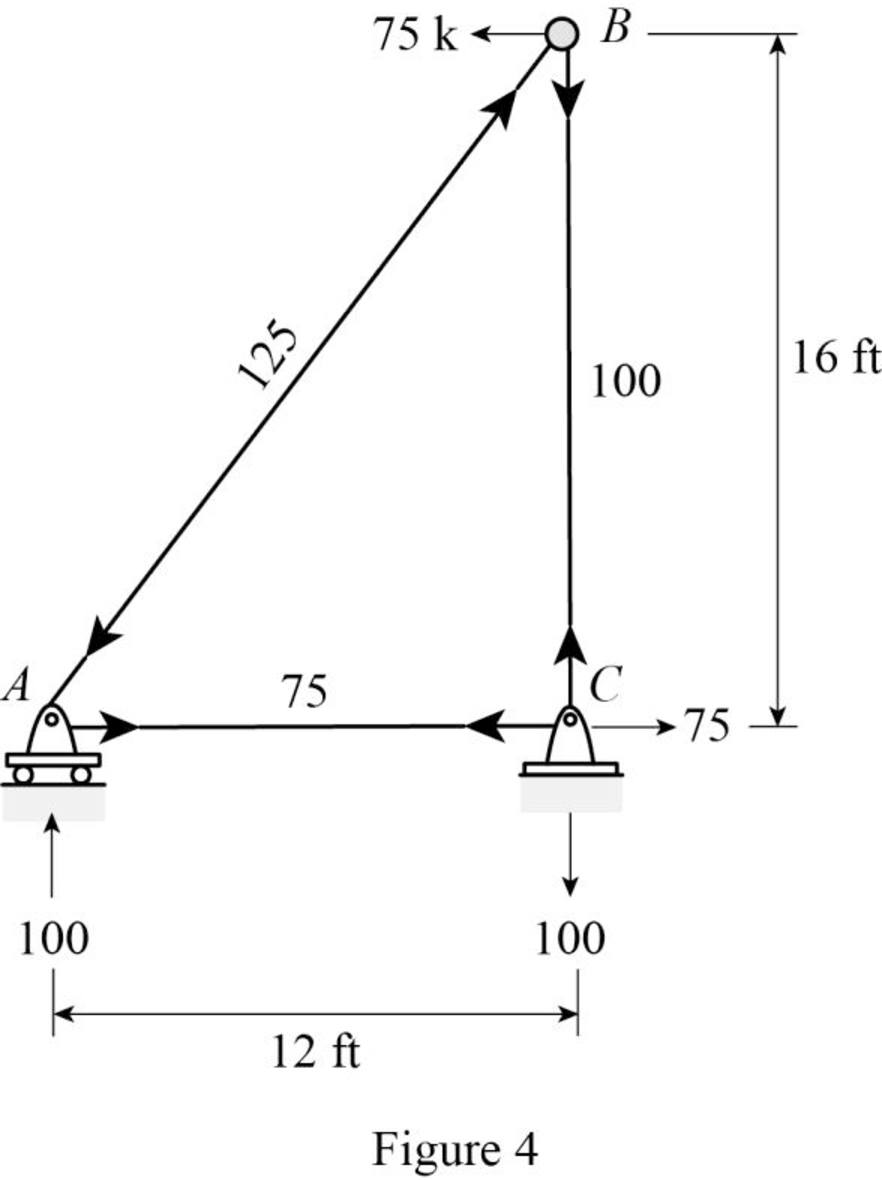
Consider the virtual system:
For horizontal deflection apply l k at joint B in horizontal direction.
Find the member axial force (Fv1 ) due to virtual load using method of joints:
Sketch the free body diagram of the truss as shown in Figure 5.
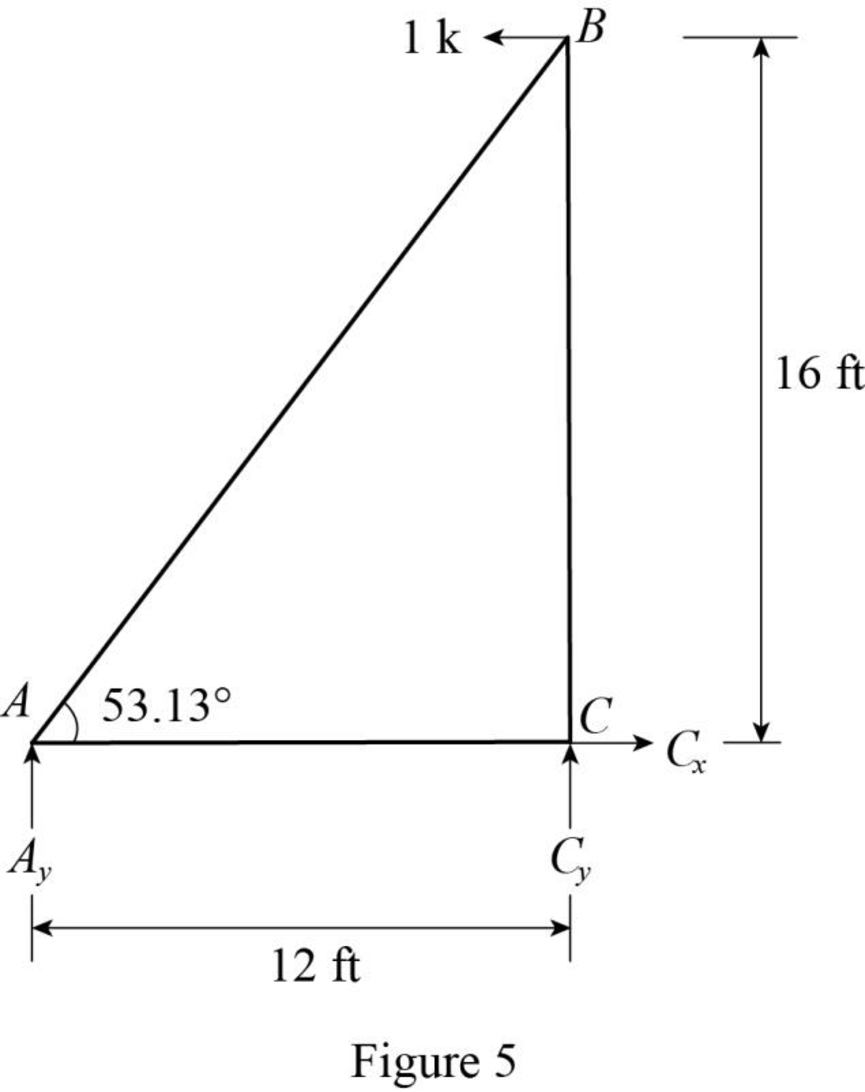
Refer Figure 1 and Figure 5.
The real system is similar to the virtual system except the load of 75k acting in the horizontal direction. So divide the real force (F) by 75 to obtain the virtual force (Fv1).
The virtual force in the member AB is (Fv1)AB=FAB75.
Substitute −125 k for FAB.
(Fv1)AB=−12575=−53 k
The virtual force in the member AC is (Fv1)AC=FAC75.
Substitute 75 k for FAC.
(Fv1)AC=75 k75=1 k
The virtual force in the member BC is (Fv1)BC=FBC75.
Substitute 100 k for FAC.
(Fv1)BC=100 k75=43 k
Sketch the resultant diagram of the virtual system (Fv1) as shown in Figure 6.
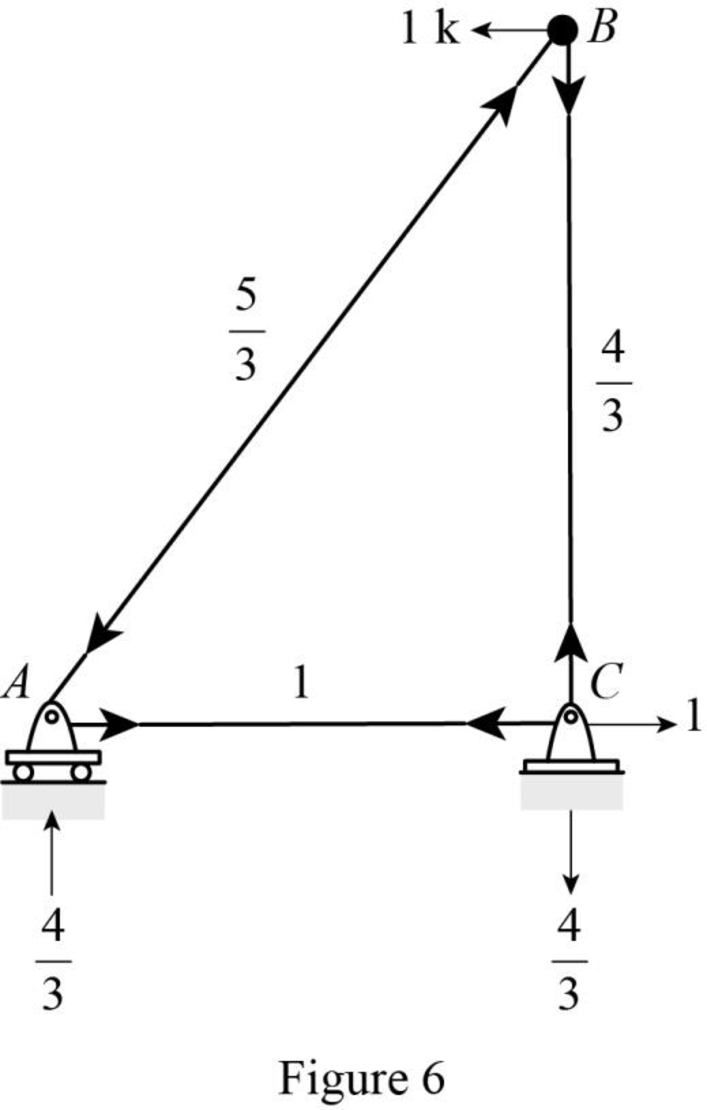
Consider the virtual system:
For vertical deflection apply l k at joint B in vertical direction.
Find the member axial force (Fv2) due to virtual load using method of joints:
Sketch the free body diagram of the truss as shown in Figure 7.
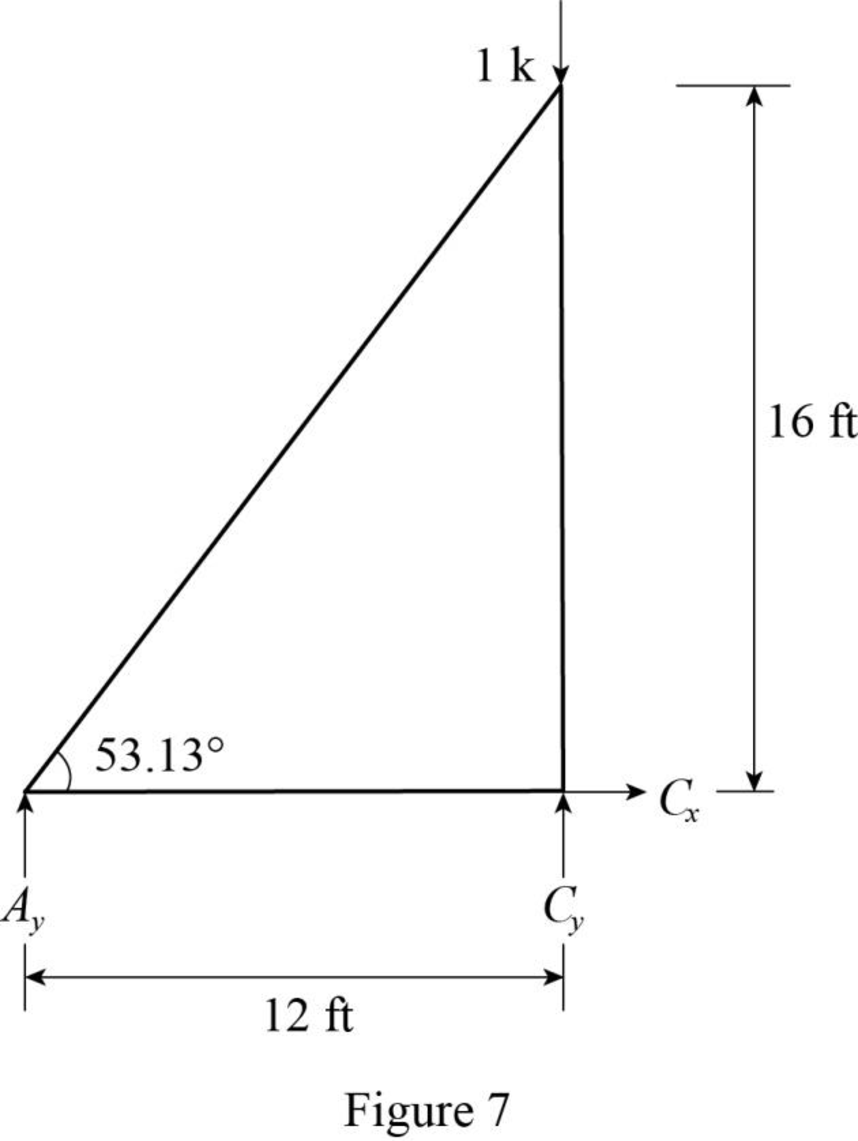
Find the reactions at the supports using equilibrium equations:
Summation of forces along x-direction is equal to 0.
+→∑Fx=0Cx=0
Summation of moments about C is equal to 0.
∑MC=0Ay=0
Summation of forces along y-direction is equal to 0.
+↑∑Fy=0Ay+Cy−1=0
Substitute 0 for Ay.
0+Cy−1=0Cy=1 k↑
The reaction at A is zero. So the member AB and AC satisfies the zero force member condition.
Therefore, (Fv2)AB=0 and (Fv2)BC=0.
Sketch the free body diagram of joint C as shown in Figure 8.
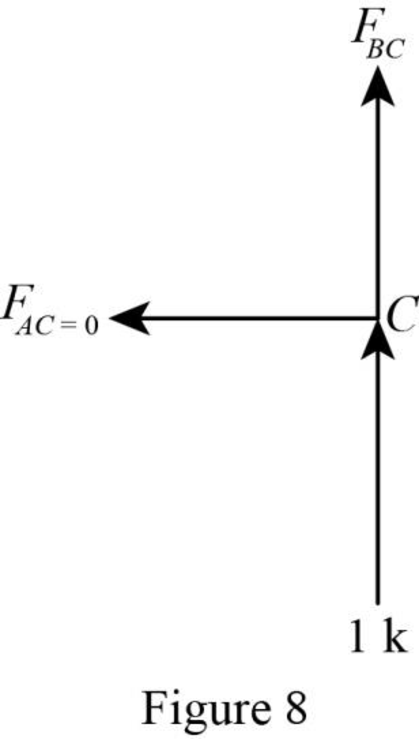
Apply equilibrium equation to the free body diagram of joint C:
Summation of forces along y-direction is equal to 0.
+↑∑Fy=01+FBC=0(Fv2)BC=−1 k
Sketch the resultant diagram of the virtual system (Fv2) as shown in Figure 9.
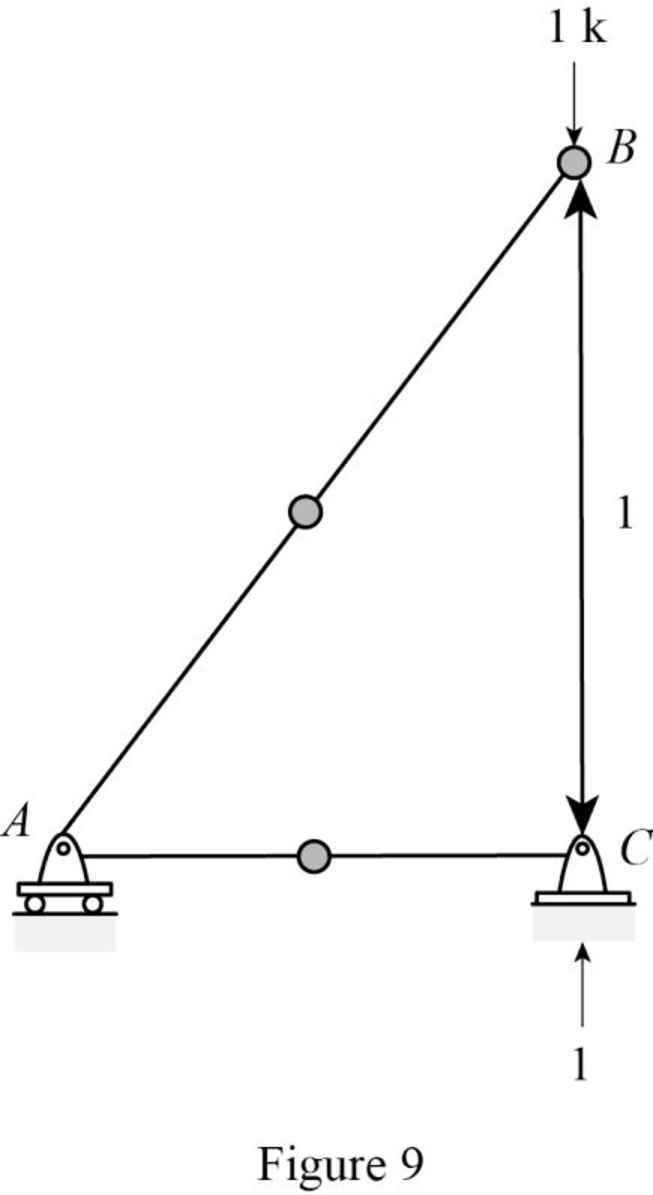
The expression to find the deflection 1(Δ) is shown below:
1(Δ)=∑Fv(FLAE)
Here, L is the length of the member, A is the area of the member, and E is the young’s modulus of the member.
For E and A is constant, the expression becomes,
(1 k)Δ=1AE∑FvFL (1)
Length of the member AC is,
LAC=12 ft=12 ft(12 in.1 ft)=144 in.
Similarly convert the length of the remaining member and show in column 2 of Table 1.
Find the product of Fv1FL for the member AC:
Substitute 1 k for Fv1 , 75 k for F, and 144 in. for L.
Fv1FL=(1)(75)(144)=10,800 k2-in.
Similarly calculate for the remaining member and show in column 5 of Table 1.
Find the product of Fv2FL for the member AC:
Substitute 0 for Fv2 , 75 k for F, and 144 in. for L.
Fv1FL=(0)(75)(144)=0
Similarly calculate for the remaining member and show in column 7 of Table 1.
Frame a table for the above calculated values.
Summarize the calculated values as shown in Table 1.
| Member |
L (in.) | F(k) | Fv1(k) | Fv1FL(k2-in.) | Fv2(k) | Fv2FL(k2-in.) |
| AC | 144 | 75 | 1 | 10,800 | 0 | 0 |
| AB | 240 | −125 | −53 | 50,000 | 0 | 0 |
| BC | 192 | 100 | 43 | 25,600 | −1 | −19,200 |
| ∑ | 86,400 | −19,200 |
Find the horizontal deflection at joint B (ΔBH):
Substitute 86,400 k2-in. for ∑Fv1FL, 5.25 in.2 for A, and 29,000 ksi for E in Equation (1).
(1 k)ΔBH=86,400 k2-in.(5.25 in.2)(29,000 ksi)(1 k)ΔBH=0.567 k-in.ΔBH=0.567 in.
Therefore, the horizontal deflection at joint B is 0.567 in.←_.
Find the vertical deflection at joint B (ΔBV):
Substitute −19,200 k2-in. for ∑Fv2FL, 5.25 in.2 for A, and 29,000 ksi for E in Equation (1).
(1 k)ΔBV=−19,200 k2-in.(5.25 in.2)(29,000 ksi)(1 k)ΔBV=−0.126 k-in.ΔBV=0.126 in.↑
Therefore, the vertical deflection at joint B is 0.126 in.↑_.
Want to see more full solutions like this?
Chapter 7 Solutions
Structural Analysis, SI Edition
- 10.37 What is ffor the flow of water at 10°C through a 30-cm cast iron pipe with a mean velocity of 24 m/s?arrow_forward10.60 As shown, water (15°C) is draining from a tank through a galvanized iron pipe. The pipe length is L = 2 m, the tank depth is H = 1 m, and the pipe is a 0.5-inch NPS schedule 40. Calculate the velocity in the pipe. Neglect component head loss. H Pipe of diameter D L Problems 10.59 and 10.60arrow_forward10.53 Water is pumped through a vertical 10-cm new steel pipe to an elevated tank on the roof of a building. The pressure on the discharge side of the pump is 1.6 MPa. What pressure can be expected at a point in the pipe 110 m above the pump when the flow is 0.02 m³/s? Assume T = 20°C.arrow_forward
- 10.61 A pipeline is to be designed to carry crude oil (SG = 0.93, v = 10-5 m²/s) with a discharge of 0.10 m³/s and a head loss per kilometer of 50 m. What diameter of steel pipe is needed? What power output from a pump is required to maintain this flow? Available pipe diameters are 20, 22, and 24 cm.arrow_forwardCalculate the active earth pressure (exerted by the supported soil mass on the right) against the 10-meter-long, dense and smooth sheet pile wall shown in Figure E2:1. The ground surface is loaded with heavy construction machinery applying a pressure of q = 10.0 kPa. Other data is according to the figure.Assume the sheet pile moves sufficiently to the left to reach active failure conditions behind it, and passive failure conditions develop in the soil mass below the excavation bottom. Will the sheet pile wall hold without rain? (Calculate the forces.) Will the sheet pile wall hold if it rains? (Assume water-filled cracks.) If the sheet pile does not hold in any of the above cases – how deep would it need to be embedded in order to hold? Draw diagrams for active and passive earth pressure as well as the resultant earth pressure. gvy=grownd water levelarrow_forwardThe composite beam shown in the figure is subjected to a bending moment Mz=8 kNmMz=8kNm.The elastic moduli for the different parts are E1=30 GPa, E2=20 GPa, and E3=60GPa. a) Determine the reduced moment of inertia IredIred for the entire beam. b) Sketch the bending stress distribution in the beam.arrow_forward
- USING THE ATTACHED SKETCH , DETERMINE THE FOLLOWING: 1. INVERSE DISTANCE, NORTH AZIMUTH AND BEARING BETWEEN CP-102 AND THE SOUTHWEST BUILDING CORNER.2. DETERMINE THE INTERIOR ANGLE AT CP-101 - CP-102 AND THE SOUTHWEST BUILDING CORNER.3. WHAT ARE THE COORDINATES (N,E) AT POINT A AND POINT B IN THE ATTACHED SKETCH?arrow_forwardGiven the following Right Triangle, find the " Area by Coordinates" (Not B*H/2). Report to the nearest Sq. Ft. and to the nearest thousandth of an acre.arrow_forward1) 4,739,281 SQ.FT. = ______________________ ACRES? 2) S 90°00'00" W IS ALSO KNOW AS WHAT CARDINAL DIRECTION? 3) CALCULATE THE NORTH AZIMUTH (NAZ) OF THE FOLLOWING BEARINGS: N 31° 22' 22" E=___________________________NAZ? S 87° 29' 17" W=___________________________NAZ? S 27° 43' 27" E=___________________________NAZ? N 43° 17' 43" E=___________________________NAZ?arrow_forward
- 1) 187.25597°=_____________________________________(DEG-MIN-SEC FORMAT)? 2) CALCULATE THE BEARING AND DIRECTION IN DEG-MIN-SEC OF THE FOLLOWING: NAZ 142°49'18"=____________________________(BEARING/DIRECTION DEG-MIN-SEC)? NAZ 180°00'00"=____________________________(BEARING/DIRECTION DEG-MIN-SEC)? NAZ 270°00'00"=____________________________(BEARING/DIRECTION DEG-MIN-SEC)?arrow_forwardA traffic signal has a 60-second cycle length (Red time + Green time). For the travel direction of interest, the red and green times are 30 seconds each, the arrival rate is constant at 20 [veh/min] and the saturation flow (i.e., the departure rate) is 1 [veh/sec]. a. Calculate the average delay (for all vehicles) for the travel direction of interest. b. Assume a work zone on the street downstream of the intersection so that only 25 [veh/min] (in the direction of interest) can pass. Calculate the average delay caused by the work zone to a vehicle leaving the intersection. Assume that the queue at the work zone never backs- up into the intersection. c. Discuss qualitatively the implications of queue spillback from the work zone on the delay of the system. Traffic Direction (a) Traffic Direction (b)arrow_forwardCalculate the active earth pressure (exerted by the supported soil mass on the right) against the 10-meter-long, dense and smooth sheet pile wall shown in Figure E2:1. The ground surface is loaded with heavy construction machinery applying a pressure of q = 10.0 kPa. Other data is according to the figure.Assume the sheet pile moves sufficiently to the left to reach active failure conditions behind it, and passive failure conditions develop in the soil mass below the excavation bottom. Draw diagrams for active and passive earth pressure as well as the resultant earth pressure. Questions to Answer: Will the sheet pile wall hold without rain? (Calculate the forces.) Will the sheet pile wall hold if it rains? (Assume water-filled cracks.) If the sheet pile does not hold in any of the above cases – how deep would it need to be embedded in order to hold?arrow_forward
